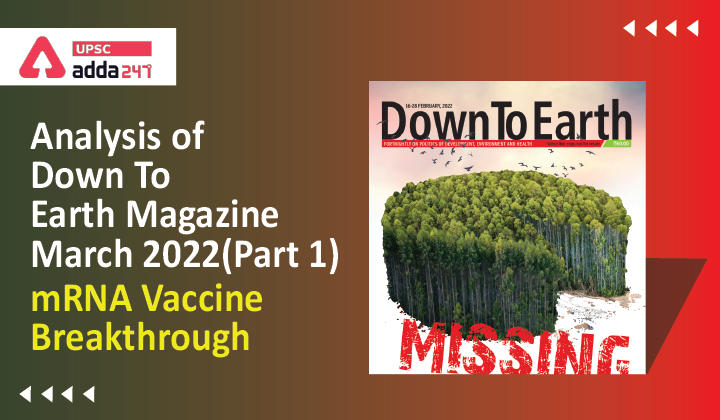Table of Contents
Analysis Of Down To Earth Magazine: ”mRNA Vaccine Breakthrough”
Relevance
”GS 3: Health”
Introduction
- Recently, South African scientists established their first COVID mRNA vaccine technology transfer hub.
- South Africa has proved that with a little bit of financial help from the rich nations and technological aid from the World Health Organization (who), it can do what the developed nations have done.
- This is a huge morale-booster for Africa, which exemplifies the glaring inequity in access to vaccines, with close to 90 per cent of the population yet to get even a single dose.
- The first African countries selected to receive the technology necessary to produce mRNA vaccines against COVID-19 are Egypt, Kenya, Nigeria, Senegal, South Africa and Tunisia.
Key Facts About COVID-19 mRNA Vaccines
- mRNA vaccines do not use the live virus that causes COVID-19 and cannot cause infection with the virus that causes COVID-19 or other viruses.
- mRNA never enters the nucleus of the cell where our DNA (genetic material) is located, so it cannot change or influence our genes.
- Our cells break down mRNA and get rid of it within a few days after vaccination. Scientists estimate that the spike protein, like other proteins our bodies create, may stay in the body up to a few weeks.
What is the global mRNA technology transfer hub?
- The WHO’s global mRNA technology transfer hub was established in 2021 to support manufacturers in low- and middle-income countries to produce their own vaccines, ensuring that they have all the necessary operating procedures and know-how to manufacture mRNA vaccines at scale and according to international standards.
- Primarily set up to address the COVID-19 emergency, the hub has the potential to expand manufacturing capacity for other products as well, putting countries in the driver’s seat when it comes to the kinds of vaccines and other products they need to address their health priorities.
- The WHO mRNA technology transfer hub is part of a larger effort aimed at empowering low- and middle-income countries to produce their own vaccines, medicines and diagnostics to address health emergencies and reach universal health coverage.
What is mRNA?
- Messenger ribonucleic acid, or mRNA for short, is a single-stranded molecule that carries genetic code from DNA to a cell’s protein-making machinery.
- Without mRNA, our genetic code wouldn’t be used, proteins wouldn’t be made, and your body wouldn’t work.
- If DNA is the bank card, then mRNA is the card reader.
- The mRNA, in this case, is coded to tell the cells to recreate the spike protein of the coronavirus SARS-CoV-2, which causes Covid-19.
- The genius of mRNA vaccines is there’s no need to inject the antigen itself. Instead, these vaccines use the genetic sequence or “code” of the antigen translated into mRNA.

- It is the spike protein — which appears as spikes on the surface of the coronavirus — that initiates the process of infection; it allows the virus to penetrate cells, after which it goes on to replicate.
- A coronavirus vaccine based on mRNA, once injected into the body, will instruct the body’s cells to create copies of the spike protein. In turn, this is expected to prompt the immune cells to create antibodies to fight it.
- These antibodies will remain in the blood and fight the real virus if and when it infects the human body.
Why mRNA based treatment is important?
- mRNA based treatment started in mid-90’s and it has additional benefits over traditional vaccines.
- mRNA vaccines can be made and developed rapidly which is why vaccines of Moderna Inc and BioNTech/Pfizer were among the earliest to reach the highly regulated markets in the West.
- mRNA vaccines allow for a high degree of modulation including addressing cancer treatments.
- They are non-infectious causing lower side effects.
Conclusion
Future mRNA vaccine technology may allow for one vaccine to provide protection against multiple diseases, thus decreasing the number of shots needed for protection against common vaccine-preventable diseases.



 TSPSC Group 1 Question Paper 2024, Downl...
TSPSC Group 1 Question Paper 2024, Downl...
 TSPSC Group 1 Answer key 2024 Out, Downl...
TSPSC Group 1 Answer key 2024 Out, Downl...
 UPSC Prelims 2024 Question Paper, Downlo...
UPSC Prelims 2024 Question Paper, Downlo...
